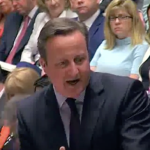 Here’s a quote from the English Secretary of State for Education:
Here’s a quote from the English Secretary of State for Education:
“If some pupils behave badly they can harm education for other pupils…We need to tackle the roots of bad behaviour….This package of measures will support local education authorities and schools who face the toughest challenges. In return for our investment we must ensure that bad behaviour is tackled head on”
The reference to supporting local education authorities probably tipped you off – this isn’t Nicky Morgan speaking. In fact it was Estelle Morris, speaking in 2002. In 2005 Secretary of State, Ruth Kelly (wow, remember her?) announced a range of measures to deal with disruptive kids ‘who stop other children learning’. However earlier this year Nicky Morgan, the current Secretary of State did announce her own plans to tackle low-level disruptive behaviour such as ‘passing notes and swinging on chairs’. To help her initiative, Ms Morgan appointed ex-teacher Tom Bennett as ‘behaviour tzar’.
If you search the terms ‘government cracks down on bad behaviour in schools’ you’ll find many examples of new strategies being announced – if you did a microfiche search in a public library, no doubt you’d unearth concerns about bad behaviour in the 19th and 20th centuries.
This prompts the question: if government crackdowns on bad behaviour in schools worked, why are we still having to do it? From my own observations, I actually think kids are as well behaved in schools as I can recall – certainly much better behaved than my schoolmates at a catholic grammar school in the 1970s. But it always looks good when a government gets tough with little oiks, so the (metaphorical) beatings will continue until behaviour improves….
And those school leaders who really want to get tough now have official approval. Never mind swinging on chairs, a school made the news this week for forcing kids to adopt the ‘university walk’ – hands clasped behind the back. I don’t know which university students actually adopt this gait – I went to a polytechnic – but it hasn’t dissuaded the headteacher from declaring that ’It was introduced to strengthen pupil safety, further raise the aspirations of pupils and to maximise learning time. Staff report that they appreciate the impact it has had on learning time and pupils continue to be very happy and excited about learning.’ Quite how walking like Prince Charles maximises learning time, or makes kids excited about learning isn’t clear, but pupils are excited enough for their parents to launch a petition to get the walk stopped, so who knows?
A student at a primary school in Darwen made the news recently when she was made to scrub the pavements, as a punishment for laughing in class. The student’s mother claims that when she complained about the Dickensian nature of the punishment, a teacher told her ‘That’s just what we do now”.
Clearly, we need some new ideas around here. Step forward the aforementioned Tom Bennett, who has been tasked with making recommendations for improving behaviour management in newly-qualified teachers.. Tom was widely reported as having worked as a nightclub bouncer, though he actually managed a nightclub and helped out occasionally on the door. Either way, he knows a thing or two about unruly behaviour. Similarly, before I taught, I worked as an entertainer in piano bars in Ibiza. Learning to keep a lid on 200 drunken Brits, hell bent on trouble, is quite instructive. So I agree with Tom when says that teachers should ‘help kids as early as possible to self-manage their behaviour, to learn good things like self-restraint and civil discourse’. This seems to me to mark an important distinction between what governments have repeatedly asked teachers to do, and how we might tackle this differently. Cracking-down on discipline has typically meant that the teacher determines what is/is not acceptable; the teacher determines an appropriate punishment; the teacher administers said punishment on an escalating scale, ultimately leading to exclusion.
Helping kids self-manage their behaviour isn’t some wooly liberal latitude – it’s increasingly seen as a sustainable strategy. Indeed a special school in Birkenhead, Kilgarth School, has gone one step further: it’s banned ‘punishment’. This school has some of the most challenging behaviour to deal with, yet is rated ‘outstanding’ by OFSTED. It concluded that the problem with punishment is that it provided no motivation to improve. The school is being advised by Goldsmith’s psychologist Dr Alice Jones who argues that difficult kids fail to make the association between bad behaviour and adverse outcomes, and don’t respond well to the staple punishment – detention: ‘Once you’ve found yourself at half past nine in the morning and you’re already in detention, where’s your impetus to conform for the rest of the day? It’s already gone.’
The school is instead adopting a strategy which would probably appall Carol Dweck – praising, and rewarding, responsible behaviour. They’re not alone.
In the US, a growing number of schools are following the methods, known as Collaborative and Proactive Solutions, designed by Dr Ross Greene. The essence of CPS (a brief description is here) is that we’ve mistakenly attempted to solve behavioural problems, unilaterally, through the imposition of ‘adult will’. Like government crack-downs, it hasn’t worked. Dr Greene instead proposes a Plan B: teachers work with kids to find changes that are both realistic and mutually satisfactory. Students take responsibility for changes which work for adults and themselves.
This non-punitive, non-adversarial, collaborative model is having a real impact in schools in the US, and CPS has a great website, packed with resources for educators: www.livesinthebalance.org. Schools adopting CPS are achieving remarkable reductions in detentions, suspensions and exclusions.
Why do we need to find some new approaches to handling behaviour in the classroom? Because it’s a relatively small step from school exclusion to the criminal justice system. The MotherJones website recently reported that ’a 2011 study that tracked nearly 1 million schoolchildren over six years… found that kids suspended or expelled for minor offences—from small-time scuffles to using phones ….were three times as likely as their peers to have contact with the juvenile justice system within a year of the punishment.’
In other words, cracking down on bad behaviour in school might be in the interests of the well-behaved students who want to learn, but we’re only just storing up problems that we’ll have to deal with further down the line. And the historically adversarial nature of behaviour management inevitably leads to the increasingly strident imposition of adult will, seen at its grotesque conclusion in the recent example from South Carolina – which, ironically, without the use of mobile phones by students, would have gone unreported:
So, how should we prepare teachers to manage behaviour in their classrooms? The English government has asked Tom Bennett to canvass opinions, so please share your views below, and at:behaviourmanagement.itt






